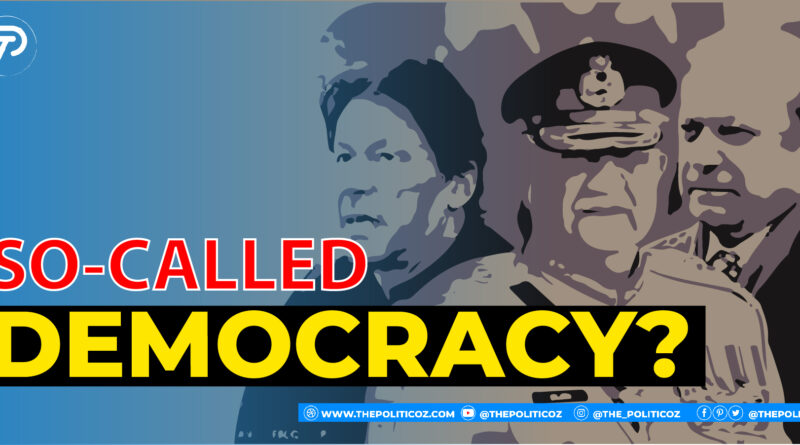So-called democracy?
Whatever the constitutional position, one thing is apparent in the final analysis, political sovereignty in Pakistan resides neither in the electorate, the Parliament, the executive, the Judiciary, nor even the Constitution, which has superiority over all the institutions it creates. It resides if it resides anywhere at all, where the coercive power resides. In practice, it is the ‘pouvoir occult’ [the hidden power], which is the ultimate authority in the decision-making process in Pakistan. They decide when to abrogate the Constitution; when who should hold it in abeyance; when elected governments should be sacked; and when democracy should be given a chance. Behind the scenes, they also decide whether an elected prime minister shall live or die. —Roedad Khan
Generally, in democracies, the relations between civilians and soldiers are governed by specific regulations and procedures, with the military personnel being answerable to the executive. Conversely, in Pakistan, the interaction between the civil and military has been a critical aspect of governing. When observing the political regimes of Pakistan from the 1950s until the present day, a visible pattern of alternating civilian and overt military control is identifiable. Throughout the nation’s history since 1947, the armed forces have directly influenced the governing of the country, resulting in a total of 34 years in control. Even when non-military personnel has been at the helm, the army has still had a hand in determining matters related to national security. Iqbal Akhund describes this phenomenon:
“In a nutshell, the government had to make decisions concerning Afghanistan, Kashmir, and India, which were highly intricate and problematic. However, in the era of Zia, military and intelligence services had taken over the power of decision-making, which they still maintained. The Ministry of Foreign Affairs was little more than a figurehead”.
When civilians attempted to disobey authority, they removed them. Between 1988 and 1999, the military approved the president to oust four civilian governments, two of which belonged to Benazir Bhutto and two to Nawaz Sharif, utilizing Article 58(2) (b) of the Constitution. It was further demonstrated in March 2009 when General Kayani told the US ambassador in Islamabad that he was prepared to reluctantly compel President Zardari to step down and suggested Asfandyar Wali Khan, leader of the Awami National Party, as a potential replacement. The Ambassador noted that Kayani was explicit in expressing his disapproval of Zardari but had an even greater distrust of Nawaz. This observation further emphasizes the long-lasting presence of the military in Pakistan’s history. This situation would have been inconceivable at the time of the country’s founding in 1947. At a celebratory gathering hosted by Jinnah, Asghar Khan and Akbar Khan were reportedly dismayed to find that the higher posts in the armed forces were still held by British officers, indicating a lack of autonomy Asghar Khan replicated” the Quaid had notified by pointing fingers at army officers that they were the servants of the state and should not be making any decisions of their own but rather obey the findings of the people’s representatives, who are the ones to determine how the country is to should be run.
No politician would have the audacity to say such a thing to the army chief today. Thus, in Pakistan, the system of democratic governance is not a three-legged stool consisting of the executive, legislative, and judicial branches, but instead is more like a garden umbrella with the army as the pole in the center, with the other organs of the state orbiting around it. The lack of clarity regarding the involvement of former Prime Minister Nawaz Sharif in the 1999 Kargil intrusions and the fact that the civilian leadership needs more control over Pakistan’s nuclear assets and policy demonstrate
the seriousness of the issue of civil-military relations in Pakistan. Consequently, Pakistani civilian governments still need to lay out national security objectives or strategies for implementation.
The clash between civil and military authorities in Pakistan is not just about control and dominance; it is about the military’s disdain for the political elite and their assumption that if left to their own devices, the politicians would damage Pakistan in some way, or at least jeopardize its vital security interests. The then commander-in-chief Ayub Khan gave explicit orders to Pakistan’s first military attaché in Washington DC, Brigadier Ghulam Gillani, in 1952. He told him that he should focus on getting military equipment from the Pentagon and not involve the Ambassador or Foreign Office as he did not believe “these civilians can be trusted with matters of national security.” Nawaz Sharif had another chance following the downfall of Musharraf in 1999 due to the unsuccessful Kargil incursions. Rather than immediately punishing Musharraf, Nawaz held off for half a year, during which time Musharraf was able to counteract the claims that it was Nawaz who had been responsible for the failure of the military and the nation through a robust media effort.
CONCLUSION
The military in Pakistan is faced with a difficult situation; they must decide whether to permit the civilian government to function as it would in any other democracy, meaning they would attempt to control aspects of defense and foreign policy that the army wishes to preserve. This is a concerning thought for the military, as they do not believe that the civilians would make the right decisions. On the other hand, the nation will continue to decline unless the civil government is given space to govern appropriately. The army has been unable to resolve this dilemma, leaving Pakistan perilously close to chaos.
Shoeb Hassan | Student of Masters in Political Science | Karachi University





Kindly, give your feedback after reading my article❤❤
It’s an impressive effort to make the students able to get artful skills to draw a historical picture of Pakistani political culture which has been practiced since its birth in the name of democracy but which was anything else.